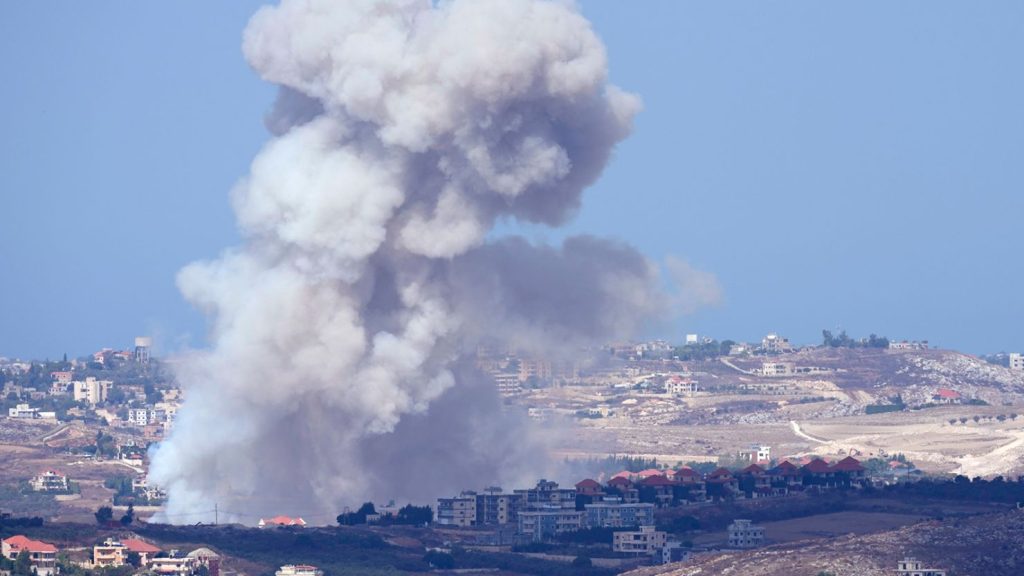Rising Tensions: The U.S. Response to Israel-Hezbollah Conflict
3 min read
Smoke rises from Israeli airstrikes on villages in the Nabatiyeh district, seen from the southern town of Marjayoun, Lebanon, Monday, Sept. 23, 2024.

Smoke rises from Israeli airstrikes on villages in the Nabatiyeh district, seen from the southern town of Marjayoun, Lebanon, Monday, Sept. 23, 2024.
Recent events have seen the U.S. assessing that Israel has significantly weakened Hezbollah following a series of military strikes. However, the U.S. remains deeply concerned about escalating tensions, particularly the risk of a ground invasion into Lebanon, which could trigger a wider conflict across the Middle East, according to officials.
One U.S. official remarked, “We are the closest we’ve been to spiraling into a regional war” since Hamas’s attack on October 7. In response to this attack, Hezbollah launched drone and rocket assaults against Israel, igniting what had previously been a relatively quiet border.
Last week, the conflict intensified when Israel executed covert operations that disrupted Hezbollah’s communication systems, targeting their pagers and walkie-talkies. Israel followed this with extensive airstrikes across Beirut and southern Lebanon, leading to a significant loss of life, including hundreds of civilians and key Hezbollah leaders. In retaliation, Hezbollah targeted Israeli installations, including the Ramat David air base.
U.S. officials believe neither side desires a full-scale war. However, skepticism surrounds Israel’s strategy of “escalate to de-escalate,” with a senior State Department official expressing doubts about its effectiveness. The official noted, “I can’t recall a time when escalation led to de-escalation and stability.”
The potential involvement of Iran, a principal supporter of Hezbollah, poses an additional concern. Iranian officials have warned of “dangerous consequences” stemming from Israeli actions. While Tehran has yet to engage militarily, there are fears that it may intervene if Hezbollah is perceived to be at risk.
According to U.S. assessments, Israel has successfully degraded Hezbollah’s operational capabilities over the past week, impacting its command structure and potentially reversing years of progress. One official stated, “They’ve probably been taken 20 years backwards” due to the cumulative effects of Israel’s operations.
In light of rising tensions, the Pentagon announced the deployment of additional troops to the Middle East “out of an abundance of caution.” This development heightens the stakes for President Joe Biden’s upcoming address at the UN General Assembly, although expectations for a resolution appear low given previous failures to broker a ceasefire between Israel and Hamas.
Amid these escalating tensions, global allies are seeking “concrete ideas” for de-escalation. While it remains unclear if Israel will conduct a ground invasion of Lebanon, U.S. officials emphasize the importance of taking Israeli military preparations seriously. The official clarified that the frequency of Israeli strikes should not be interpreted as a measure of the success of U.S. diplomatic efforts to encourage restraint.
On Monday alone, Israel targeted approximately 1,600 Hezbollah positions, aiming at long-range missiles capable of reaching deep within Israeli territory. The strikes resulted in significant civilian casualties, with the Lebanese health ministry reporting at least 492 deaths, including many children and women, making it the deadliest single day of conflict since the 2006 war between Israel and Hezbollah.
Hezbollah retaliated with over 200 rocket launches toward Israel, with some intercepted near Haifa, Israel’s third-largest city. An Israeli official indicated that the objective of these military operations is not to instigate a full-scale war but to enable the safe return of 70,000 citizens displaced by the conflict.
While the Israeli Defense Forces (IDF) maintain that they are prepared for any necessary operations, including a potential ground invasion, they also recognize the complexities involved. “Is the army prepared?” asked IDF spokesperson Rear Adm. Daniel Hagari. “Yes, the army is in full readiness.”
Israel’s strategic operations, including the disruption of Hezbollah’s communication capabilities, have placed the group in a vulnerable position. Yet, Hezbollah remains a formidable adversary, possessing an arsenal estimated at 150,000 rockets and missiles, significantly enhanced through Iranian support.
The Israeli government has declared a “special situation” nationwide, implementing strict measures affecting civilian life, including school closures and patient relocations in hospitals near the northern border. Meanwhile, the international community watches closely for Iran’s reaction to the ongoing conflict, as tensions continue to escalate in the region.